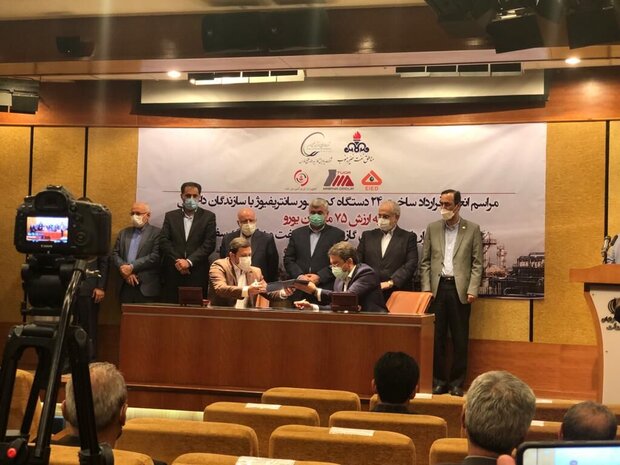The Persian Gulf Bidboland Gas Refining Company has signed the deals for the construction of 24 centrifugal compressors and a gas processing plant at Ragsefid Operational District.
A signing ceremony was held at the Iranian Oil Ministry on Monday to sign the contracts in the presence of Oil Minister Bijan Zanganeh as well as Mahmoud Aminnejad, the CEO of Bidboland Persian Gulf Gas Refining Company, along with the CEOs of the three Iranian firms.
The concluded deals entail construction, installation and commissioning of 24 centrifugal compressors with a value of 75 million Euros with Oil Turbo Compressor Company (OTC), MAPNA Turbine Engineering and Manufacturing Company (TUGA), and a contract for the collection of associated petroleum gas in the Ragsefid operational district worth 90 million Euros with Energy Industries the Engineering and Design (EIED) Company.
OTC is responsible for the construction of 16 centrifugal compressors for Aghajari 5 and Bibi Hakimeh 1 operation units and Pazanan gas pre-compression station. On the other hand, TUGA will build eight centrifugal compressors at a gas collection plant for Bibi Hakimeh 2.
The gas collection plant is aimed at preventing gas flaring, observing environmental considerations, creating value added from collecting the flared gases in the east of Karun River and providing sustainable feedstock to petrochemical companies. To this end, two contracts for "improvement and construction of gas collection facilities" were signed in September 2018 between the National Iranian South Oil Company (NISOC) and the Persian Gulf Bidboland Gas Refining Company and Maroon Petrochemical Company with a total investment of 1.3 billion dollars.
The $1.109 billion contract with Bidboland Persian Gulf Gas Refining Company includes 27 projects for construction of flared gas collection plants, improvement of existing plants and transfer of collected gas to Bidboland Refinery.
With the implementation of these projects, about 600 million cubic feet per day of associated gases will be collected and transferred to the refinery and about 1.5 million tons of C2 + will be added to the refinery’s feed annually, which is a big step in solving the feedstock shortage of this refinery and the nearby petrochemical plants.
Also, with the implementation of this project and processing of associated gases, about 400 million cubic feet of light gas will be provided to the National Iranian Oil Company on a daily basis, which will be used for injection into oil fields or to supply fuel to the country.
MR/SHANA
